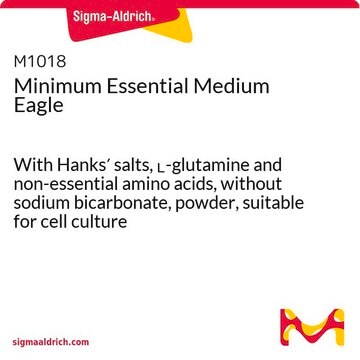51416C
Minimum Essential Medium
with Earle′s Balanced Salts, with non-essential amino acids, without L-glutamine, liquid, sterile-filtered, suitable for cell culture
Synonym(s):
Minimum Essential Medium Eagle, MEM
About This Item
Recommended Products
description
for research or for further manufacturing use
sterility
sterile-filtered
form
liquid
technique(s)
cell culture | mammalian: suitable
components
Earle’s salts (5% CO2): yes
L-glutamine: no
shipped in
ambient
storage temp.
2-8°C
Looking for similar products? Visit Product Comparison Guide
General description
Application
supplement
Storage Class Code
12 - Non Combustible Liquids
WGK
WGK 1
Flash Point(F)
Not applicable
Flash Point(C)
Not applicable
Certificates of Analysis (COA)
Search for Certificates of Analysis (COA) by entering the products Lot/Batch Number. Lot and Batch Numbers can be found on a product’s label following the words ‘Lot’ or ‘Batch’.
Already Own This Product?
Find documentation for the products that you have recently purchased in the Document Library.
Customers Also Viewed
Our team of scientists has experience in all areas of research including Life Science, Material Science, Chemical Synthesis, Chromatography, Analytical and many others.
Contact Technical Service




